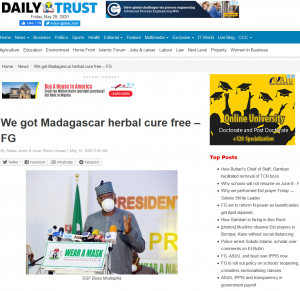By Theophilus Abbah, PhD
Today, Covid-19, as they say, is the elephant in the (news)room – it is perceived from diverse angles, and hundreds of hands are in the pot, cooking the antidote to it. Without a cure (a recurring statement in the World Health Organisation (WHO’s) advisory on the pandemic) virologists, epidemiologists, laboratory scientists, and other researchers in the field of Medicine, are engaged in a fierce race to grab the money-spinning solution to Covid-19, the fear that has caged the world. In many African societies where research into Medicine is sluggish, many individuals have emerged from their farms and forests with supposed herbal cures for coronavirus.
For many, herbs and roots may be considered as a quick fix for the pandemic, considering the fact that the long and meticulous processes of isolating and subjecting the virus and antidotes to laboratory tests, may be akin to the biblical Israelites prolonged journey through the wilderness to the Promised Land. Journalists are feasting on stories about herbal cures, and the Federal Government has admitted three out of many for test. Government is taking delivery of herbal solutions from Madagascar.
However, journalists must not be carried away by all winds of cures. This was the advice of Professor Martins Emeje of the Nigerian Institute of Pharmaceutical Research, Abuja to Daily Trust Foundation. Instead of printing and publishing claims of cure by anxious promoters of herbal cures, some of them pharmacist, laboratory scientists, and ‘native doctors,’ journalists should do the due diligence by probing those claims.
First, journalist must realise that there is a difference between herbal medicine and traditional medicine. Herbal medicine is derived from plants that grow on soil. These plants have chemical components and their potency in treating any ailment could be scientifically verified. Most drugs have their origin from plants.
However, traditional medicine is rooted in culture, tradition and even religion of the people who administer it. For instance, bone-setters in some traditional societies do not just apply herbs and ointments. They make incantations to some spirits. Treatments and healings that take place in the process of such traditional medical attention cannot be scientifically verified. Therefore, in reporting local herbal solutions to ailments, journalists must distinguish between those that are traditional and those that are herbal.
In the treatment of coronavirus, the cures that journalists should give attention to should be herbal. Professor Emeje suggests that before journalists report or publicize any of such solutions, they should consider several factors, among them are the following:
- Patients: For anyone who claims to have cure for Covid-19, journalists should ask, primarily, how he accessed his patients. This is because Covid-19 is a public health emergency, meaning anyone who tests positive to it must be quarantined, and must be closely monitored by health authorities, until they recover from the ailment. How did the person who claims to have herbal cure access the patients that the promoters of herbal cures claimed to have successfully treated.
- In-vitro study: This has to do with the extraction of the properties of herbs and administering it on viruses, using cell-culture. At present, there is hardly any lab in the country that can isolate covid-19 virus for such a test. What many herbal cure advocates do is to assume that because their herbs could handle some of the symptoms associated with Covid-19, they could eventually cure anyone who has the ailment. As there is no in-vitro study, how the herbal solution works should be clearly explained to the reporter.
- Tests on animals: For any medicine to be seen as being able to cure human beings, it must be tested on mammals, especially rats, monkeys, apes, etc. The virus is planted in them, while various doses of the herbal solution is administered on them to find out what dose could counter the virus. Later, it could be administered on non-primate mammals, like dogs, chimpanzee, etc.
- Pre-clinical test data: The promoter of the herbal cure should produce the results of the above tests, proving that it had positive results. Without testing the herbal solution in a lab and on animals, it is totally wrong and unethical to administer them on human beings.
- NAFDAC Report: The National Agency for Food, Drug Administration and Control (NAFDAC) is the authority in authenticating any drug for treatment in Nigeria. Any herbal solution that is not approved by NAFDAC is used at the patient’s perils. What NAFDAC does is to review all the previous results before testing the drug on healthy persons, to know how safe it would be, and what dose is healthy for consumption.
- Test on sick patients: If the drug passes the test on healthy people, NAFDAC could use the solution on some sick persons, in this case, some Covid-19 positive individuals who are, at present, on isolation. If the rate of recovery is less than 30 percent when administered on sick persons, then the recovery cannot be attributed to the drug. There are persons who could recover from Covid-19 by taking drugs that treat all manifest symptoms. For the drug to be given credit for the cure, there should be, at least, 70 per cent recovery rate among those on whom it is tested.
- NAFDAC approval: When the herbal solution passes the above tests, it would be approved by NAFDAC for use.
Journalists who report Covid-19 should be very cautious; we must ask promoters of herbal drugs pertinent questions so that we don’t mislead our readers who trust our reporting.
Dr Abbah is Programme Director at Daily Trust Foundation.

